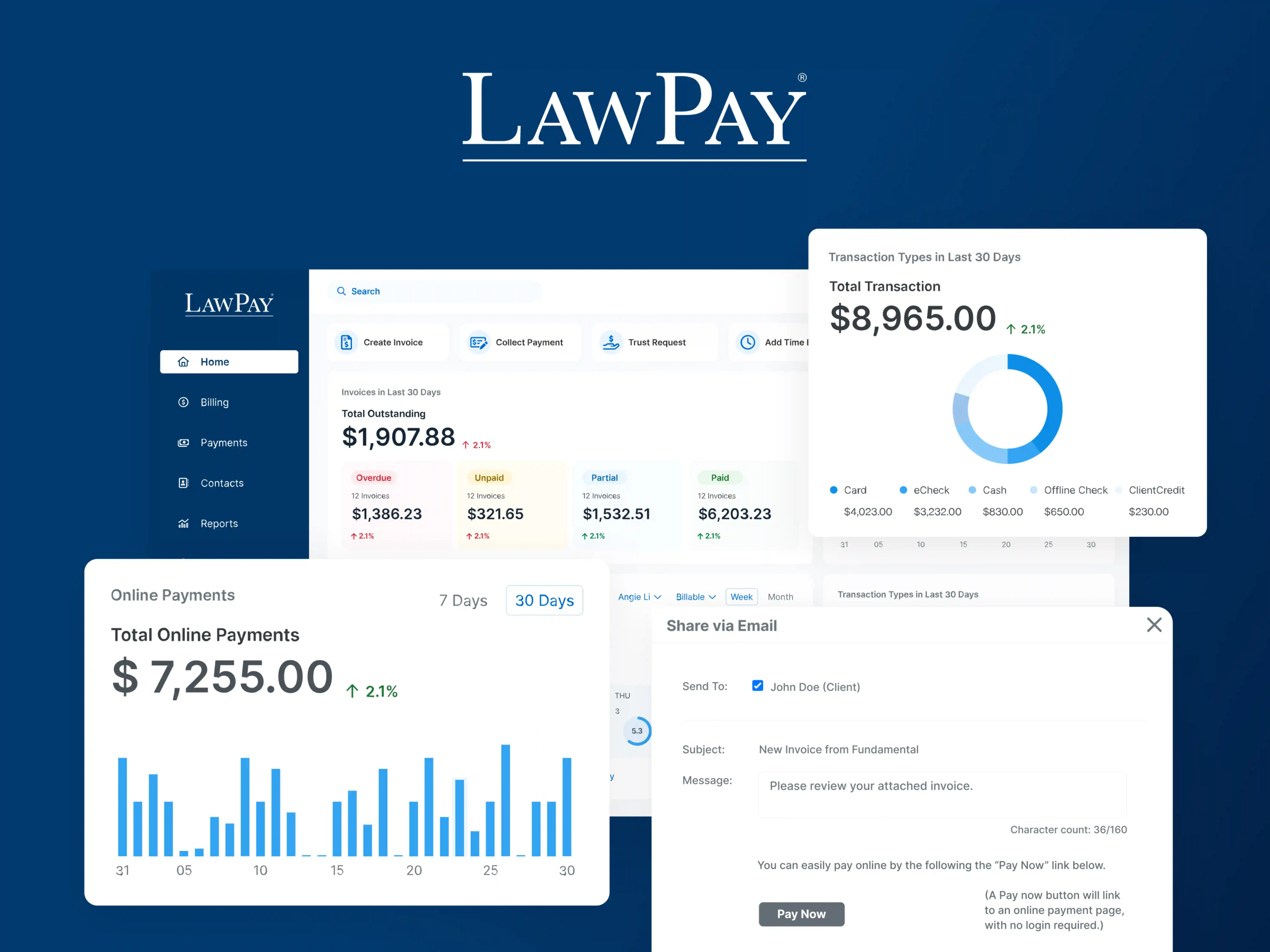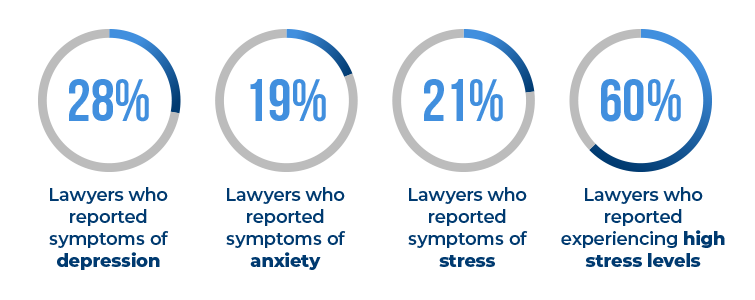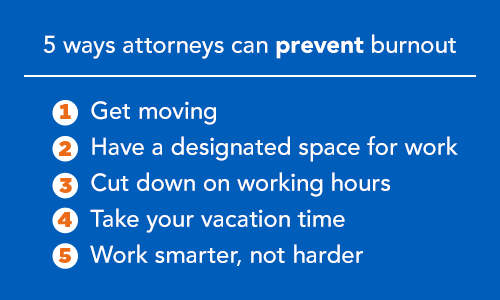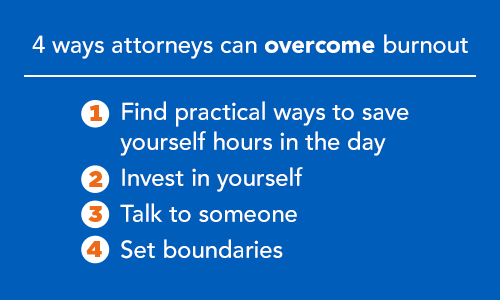Legal professionals face a unique set of challenges in their daily work, including high workloads, demanding clients, and complex legal issues. These demands, combined with the pressure to constantly perform at a high level, can lead to burnout, a state of physical, emotional, and mental exhaustion.
To help legal professionals recognize, prevent, and overcome burnout, this article will explore the causes and symptoms of burnout, practical strategies for preventing burnout, and effective methods for managing it when it occurs.
By taking proactive steps to manage stress and maintain a healthy work-life balance, legal professionals can continue to excel in their careers while avoiding negative consequences.
Schedule a demo to see what LawPay can offer your firm.
Book Now
Lawyer burnout statistics

Studies have shown that legal professionals are at a higher risk of experiencing mental health issues, including burnout. A survey conducted in 2016 by the American Bar Association found that 28% of lawyers reported symptoms of depression, 19% reported symptoms of anxiety, and 21% reported symptoms of stress. Additionally, this research shows that over 60% of lawyers experience high stress levels and almost half report feeling dissatisfied with their work-life balance.
Following the stressful and uncertain years during and directly following the COVID-19 pandemic, a Bloomberg study indicated a stagnation, and at some points even a decline, in the well-being of legal professionals.
However, it’s not just your well-being that can suffer in the wake of poor mental health, it can also affect your business. Burnout significantly increases the risk of employee turnover - which costs firms billions of dollars annually in recruitment costs. The National Association for Law Placement found that losing just one associate can cost a firm up to $500,000.
Why do lawyers burnout?
Burnout occurs when a person feels chronic exhaustion, cynicism, inefficacy, or a sense of being unimportant. People often use burnout to describe many stressors, but it is not synonymous with general stress. There is a continuum of stress, with thriving on one end and burnout on the other. There are other stress-related emotions as well, including frustration, ineffectiveness, exhaustion, overextension, and languishing.
That being said, we’ve already established legal professionals experience a disproportionately high level of stress, as well as burnout. Why is that?
Lawyers can experience burnout for several reasons, including high pressure from the demands of tight deadlines, complex cases, and high stakes. Long work hours lead to exhaustion, a lack of control over their workload, feelings of isolation, poor work-life balance, and ethical dilemmas.
Law firms' demanding and competitive environment puts pressure on attorneys to work extended hours and handle a heavy workload.
On top of the immense pressures in the office, firms tend to lack resources that can help alleviate stress in the workplace, including flexible schedule options, open feedback, office engagement, and social support groups.
What are common signs of lawyer burnout?
Understanding the common signs of burnout is crucial in recognizing and preventing burnout in legal professionals. Familiarize yourself with these early signs of attorney burnout:
Exhaustion and physical fatigue
Mental and emotional exhaustion
Feelings of cynicism, detachment and decreased job satisfaction
Reduced productivity, creativity and motivation
Difficulty concentrating and making decisions
A sense of ineffectiveness or lack of accomplishment
Increased absenteeism and turnover intentions
Decreased resilience and increased emotional reactivity
Physical symptoms such as headaches, sleep disturbances and digestive problems
If you notice these symptoms in yourself or a colleague, you can course correct before the problem becomes unmanageable. By recognizing and addressing the problem early, you may be able to avoid the serious consequences that may follow.
5 ways attorneys can prevent burnout
Burnout can be difficult to fully avoid, but it can be managed and prevented to some extent. While practicing “self-care” can seem unattainably frivolous (who has the time for yoga retreats, spa days, and beach vacations?), it may be the key to catching and reversing early symptoms of burnout. Avoid bringing yourself to the brink of a breakdown by incorporating self-care habits into your daily routine.

Get moving
Working eight hours (or more) straight can seem like your only choice, especially when you have so many tasks and tight deadlines. However, marathon work sessions can leave you emotionally and mentally exhausted. Your work should not focus purely on quantity. Instead, if you prioritize taking multiple breaks throughout the day, you will most likely begin to notice a rise in your productivity and in the quality of the work you output.
Taking a 2-minute break every hour to stretch or do deep breathing can lead to you being more in tune with your mental and physical wellbeing. Taking a fitness class during lunch, walking around the block or going on a bike ride can help you stay energized through a long day. If you can find the time to get some fresh air, that’s even better! Physical activity and time outside are proven to help regulate and lessen stress.
Have a designated space for work
Whether you are working in an office or from your home, it is important that you have a specific space where you work. When it is time to transition into your leisure time, your brain understands you are leaving your work space (and all thoughts of work) behind.
Cut down on working hours
A good work life balance is crucial for avoiding burnout, and there’s evidence that the “always on” culture does more harm than good in the workplace. A good practice to implement is choosing (and sticking to) a consistent end time and avoid working into the night or on weekends. Also, as hard as it may be, try not to check your email after hours. If the temptation is too great, you can consider turning off your phone's email and instant message notifications. Also consider limiting your daily news and social media intake.
Lawyers have a reputation for working long hours. The ideal amount of time spent in a work week is about 45 hours. Yes, that’s TOTAL hours - not just billable hours.
Take your vacation time
U.S. workers are working longer hours and taking fewer vacation days, despite numerous studies demonstrating that taking time off can benefit physical and mental health. Taking vacations reduces stress, lowers heart disease risk, improves outlook, and motivates people to reach their goals.
Did you know that just the act of planning a vacation can reduce stress and make you happier? Some people experience an elevated mood up to eight weeks before the trip. Whether you want to explore a new place or take a stay-cation, taking time off work is refreshing and rejuvenating.
Work smarter, not harder
As a law firm grows, little inefficiencies become bigger issues and have a major impact on your bottom line and your time. When you are just starting, you can essentially manage and track everything yourself. However, you can’t afford to constantly put out fires as things grow. Wasting time doing everything yourself can eventually cost you revenue.

Revisit Your Goals: Checking in on your goals regularly will ensure that you are not spinning your wheels to accomplish things that are not in service of your greater business objectives.
Hire Help: Many lawyers handle both the substantive legal work and the administrative side of things. This can save you some money, but may become an issue as your practice grows. You must remember to focus your attention and time on things licensed attorneys can do. Take the time to hire the right people to assist you.
Create a Routine: By creating a routine for your work day, you protect your time. In addition, it helps you and your entire staff stay organized. Time is money and keeping a routine for all areas will save you time and money.
Use Technology to Automate: Since law firms are service-based, revenue earned in the legal profession is mainly based on hours billed for work on behalf of their clients. These hours include:
Administrative work separate from client work
Billing and collections
Practice management tasks
Administrative tasks can be tedious and time-consuming. Luckily, in this modern age, there are tools law firms can use to automate and streamline workflows around these types of tasks.
Legal practice management and legal billing software are two key solutions every law firm should consider incorporating into their workflows. In fact, law firms using these two softwares together report an average of 3 billable hours saved per day.
MyCase is an intuitive and powerful legal practice management software for modern law firms, designed to cover the entire client lifecycle from Lead Management, Case Management, Billing and Invoicing, and Robust reporting. Combined with LawPay’s powerful online payment processing system, law firms will have everything they need to run their business efficiently from anywhere.
4 ways attorneys can overcome burnout
While these solutions may seem intuitive, reversing burnout is often easier said than done. However, if you’re not focusing on improving your health, it will negatively affect your work. Ensure you are at the top of your game professionally by prioritizing your wellbeing.

Find practical ways to save yourself hours in the day
Start with small daily actions to balance time spent at work and time spent on non-work activities. For example, use time blocking to reduce your screen time and find ways you can streamline and automate your work.
Invest in yourself
Having fun is a good place to start if you want to know how to recover from mental exhaustion. Committing to things that make you happy will calibrate stress levels and help you reconnect with yourself on an emotional level.
Talk to someone
During stressful times, it’s important to reach out for help. If asking for assistance feels difficult, consider developing a self-care “check-in” with close friends and family members so that you can take care of each other during trying times.
Set boundaries
Many people struggle to say no when asked to take on extra work. Learning how to set boundaries at work and in relationships can help reduce the chances of further burnout.
Additional resources to help reduce lawyer stress
Practicing law can be incredibly stressful, and as a result, members of the legal profession are particularly at risk for mental health and substance abuse issues. Fortunately, there are resources to help lawyers, judges, and law students address these issues.
Lawyer Assistance Programs (LAPs) throughout the country provide confidential services and support to judges, lawyers and law students facing mental health or substance use issues. To find the lawyers assistance program, visit this directory created by the American Bar Association.
Local and State Bars: Many local, state, and specialty bar associations have easily accessible resources for legal professionals. You can find these with a quick search online.
Get back to doing what you’re meant to do
It is imperative for legal professionals and law firms to focus on the mental health of themselves and their staff to avoid and overcome burnout.
Attorneys who are well-rested and in good mental health can handle their workload more efficiently, produce better work, and are likely to stay with the firm longer. On the other hand, burnout can lead to decreased productivity, lower quality work, and increased turnover.
Schedule a demo to see what LawPay can offer your firm.
Book Now
By prioritizing well-being and addressing burnout, law firms can create a positive work environment with higher morale and job satisfaction, retain top talent, and meet their legal and ethical obligations.
About the author

Hannah DeFreitasSenior Content Writer
Hannah DeFreitas is a Senior Content Writer for leading legal software brands, including MyCase, Docketwise, CASEpeer, and LawPay—the #1 legal payment processor. She distills industry trends and data into strategic insights that empower legal professionals to streamline workflows, increase revenue, and gain a competitive edge.
